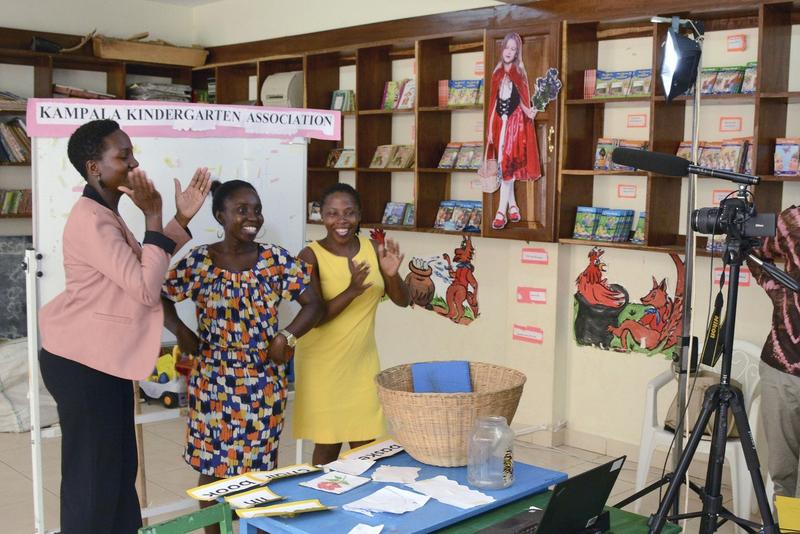 Kindergarten teachers perform during an online class in Kampala on Saturday. As a measure to contain the spread of COVID-19, schools have started to offer online classes in Uganda. (NICHOLAS KAJOBA / XINHUA)
Kindergarten teachers perform during an online class in Kampala on Saturday. As a measure to contain the spread of COVID-19, schools have started to offer online classes in Uganda. (NICHOLAS KAJOBA / XINHUA)
The World Health Organization has warned that prolonged school closures across Africa aimed at keeping students safe from COVID-19 are harming them in many ways. In a statement issued on Friday the WHO urged African governments to promote the safe reopening of schools while taking measures to limit the spread of the virus.
This decision must be guided by a thorough risk analysis to ensure the safety of children, teachers and parents and with key measures like physical distancing put in place.
Matshidiso Moeti, WHO’s regional director for Africa
According to a survey conducted by the WHO and UNICEF, the impact of extended educational disruption is significant and includes poor nutrition, stress, increased exposure to violence and exploitation, childhood pregnancies and challenges in mental development of children due to reduced interaction.
ALSO READ: Africa eyes traditional medicine as cases top 800,000
Even though African governments have been gradually easing restrictions and reopening their economies, most have yet to find the right formula to reopen schools, with some countries closing them again after reopening them and some postponing learning.
In Kenya, where schools have been closed until next year, Education Cabinet Secretary George Magoha cast doubt on reopening schools.
On Thursday Magoha said more than 100,000 schools will remain closed across the country until adequate preparations have been made to ensure full compliance with the guidelines on COVID-19 and President Uhuru Kenyatta feels it is safe to proceed.
Revised calendar
In South Africa, the department of basic education issued a revised calendar for this school year that provides for schools to reopen on Monday. The department said on Aug 1 that it had reached the decision after consultations with stakeholders. This was after Cyril Ramaphosa, South Africa's President, closed schools on July 24 after an initial reopening led to a rise in coronavirus infections among students and teachers.
According to the WHO survey on sub-Saharan African countries, schools are fully open in only six countries, they are closed in 14 countries and partially open in 19 others. About 12 countries plan to resume classroom learning next month, when the academic year starts in some countries.
Matshidiso Moeti, the WHO regional director for Africa, said Africa should not be blindsided by its efforts to contain COVID-19 and end up with a lost generation.
"Just as countries are opening businesses safely, we can reopen schools. This decision must be guided by a thorough risk analysis to ensure the safety of children, teachers and parents and with key measures like physical distancing put in place."
READ MORE: Kenya finds way to keep young engaged
Schools have paved the way to success for many Africans and provide a safe haven for many children in challenging circumstances to develop and thrive, she said.
The survey also revealed that the long-term social and economic impact of extended school shutdowns is concerning. According to World Bank modeling, school closures in sub-Saharan Africa could result in lifetime earning losses of $4,500 for each child. This may also be exacerbated by reduced earnings of parents forced to stay at home to take care of children, especially in households that cannot afford child care services.


